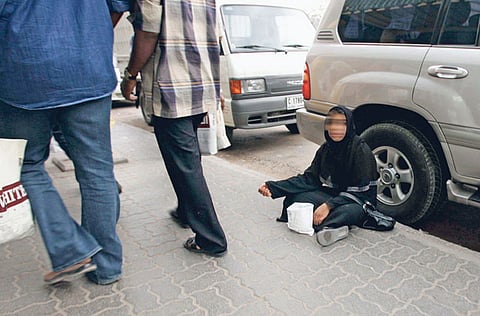Dubai Police campaign to curb begging
A campaign to curb beggar menace will kick off at the end of this month

Dubai: A campaign to curb the beggar menace will kick off at the end of this month.
Based on studies of past cases, the campaign will focus on tourist companies assisting in bringing beggars into the country.
The campaign ‘Combat street beggars' kicks off on July 25 and will continue to the end of the Eid Al Fitr vacation as mendicants increase on religious occasions and public holidays such as during Eid.
"We have realised that groups and individual beggars were issued visas with the assistance of specific tourism companies. Our focus is not only on combating street begging but those who assist these individuals," Lieutenant Colonel Mohammad Al Muhairi, Director of Tourist Security at Dubai Police, told Gulf News.
According to him, there were 1,232 street beggars in 2006. The numbers fell to 987 in 2007 and 578 in 2008. However, beggar numbers rose to 618 last year.
"Street begging occurs everywhere and in Dubai we take the matter seriously as it ruins the reputation of the country and it affects the security of the place. The presence of beggars in mosques and shopping malls or any other public areas in not a pleasant image for the country," said Lieutenant General Dahi Khalfan Tamim, Chief of Dubai Police.
During the Eid vacation, Major General Khamis Mattar Al Mazeina, Deputy Chief of Dubai Police, said, a specialised section under the tourist security department at Dubai Police has been established to combat mendicants.
"We have arrested many mendicants who were not only disturbing the public with their illegal activities but they were involved in robberies. I urge the public not to fall for the many scams played by these individuals and to contact the police when they find a street beggar," said Brigadier Khalil Ebrahim Al Mansouri, Director-General of the Criminal Investigation Department at Dubai Police.
There are many methods used by beggars to extract money from people, including pretending they don't have money to pay for essential grocery items or knocking on people's residences posing as neighbours. They make up a story that they got locked out of their house and require money to fill their car fuel tank.
"Some beggars pretend they are handicapped, or have a life-threatening disease, or are unable to provide for their families or need money for an urgent medical surgery,'' he said.
In other cases, the beggars provide fake documents about a fund raising campaign to build a mosque or a school for orphans back home.
Sign up for the Daily Briefing
Get the latest news and updates straight to your inbox



